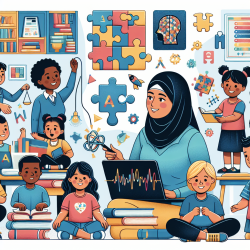As a therapist working in an educational setting, I've seen firsthand the incredible impact that knowledgeable and empathetic teachers can have on students with autism. Recently, I came across an enlightening research article titled "Awareness of Autism in Primary School Teachers," and I wanted to share some key takeaways that can help educators improve their skills and encourage further research.
Key Findings from the Research
The study, conducted on primary school teachers in Karachi, Pakistan, highlighted several important points:
- 55% of teachers knew about autism through the media, but only 9% had formal training through workshops.
- 62% of teachers believed that autism is treatable.
- 57% of teachers felt that proper training is required for teaching autistic children.
These findings underscore the need for more structured training programs to equip teachers with the necessary skills to support students with autism effectively.
Practical Steps for Teachers
Based on the research, here are some practical steps that teachers can take to enhance their understanding and support of students with autism:
- Seek Formal Training: Participate in workshops and training sessions focused on autism. These programs can provide valuable insights into the condition and effective teaching strategies.
- Utilize Reliable Resources: While media can be informative, it's essential to rely on scientifically backed resources and literature to understand autism better.
- Collaborate with Specialists: Work closely with therapists and special education professionals to develop individualized education plans (IEPs) for students with autism.
- Implement Early Intervention: Early diagnosis and intervention can significantly improve the developmental outcomes for children with autism. Teachers play a crucial role in identifying early signs and referring students for further evaluation.
Encouraging Further Research
The study also highlights the importance of ongoing research to better understand autism and improve educational practices. Teachers can contribute to this effort by:
- Staying Informed: Keep up-to-date with the latest research and developments in the field of autism.
- Participating in Studies: Engage in research studies and surveys to share your experiences and insights, which can help shape future educational strategies.
- Advocating for Resources: Advocate for more resources and support within your school or district to enhance autism awareness and training programs.
Conclusion
By taking these steps, teachers can make a significant difference in the lives of students with autism. It's not just about being aware of the condition but also about implementing effective strategies and continuously seeking to improve one's knowledge and skills.
To read the original research paper, please follow this link: Awareness of Autism in Primary School Teachers










